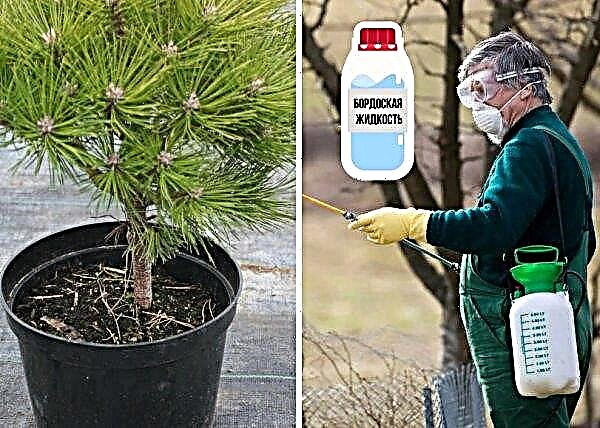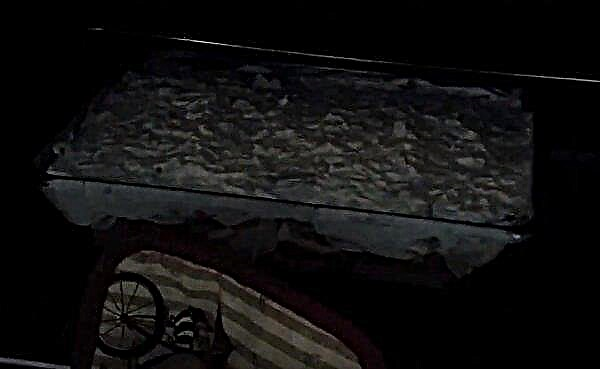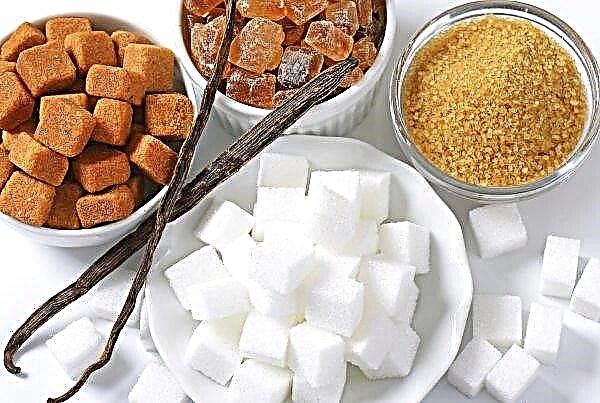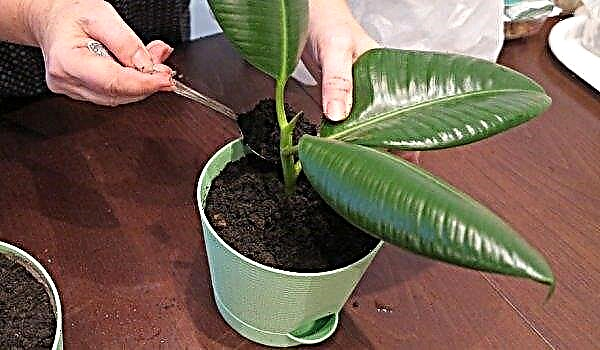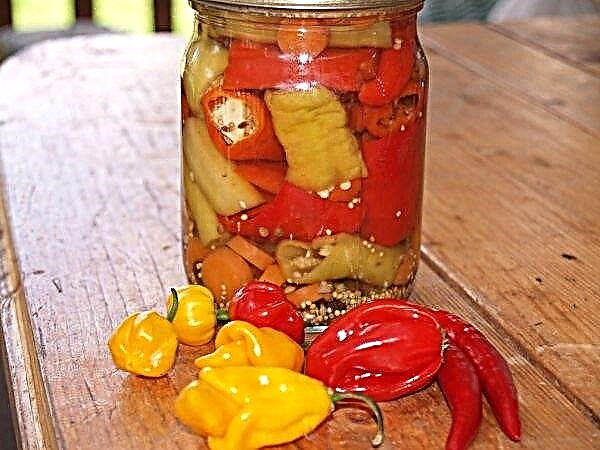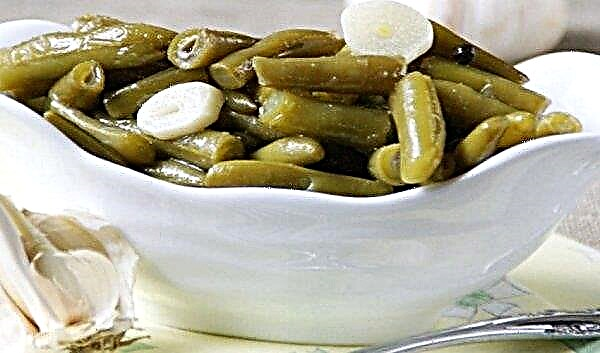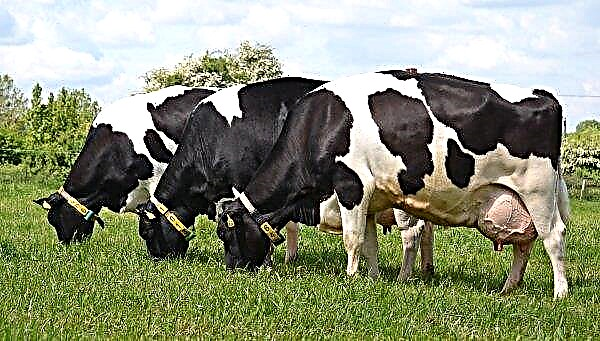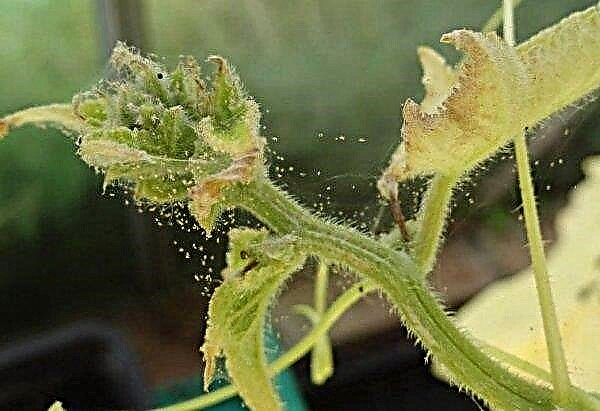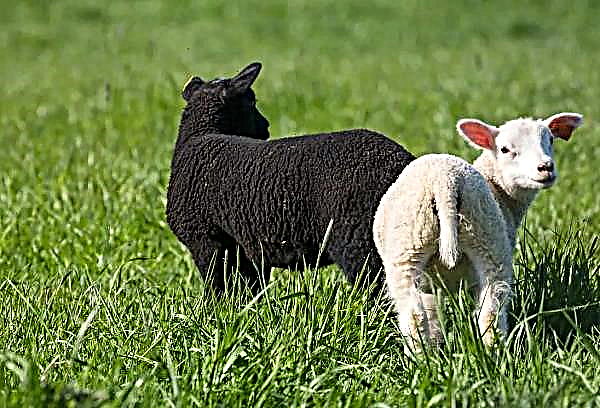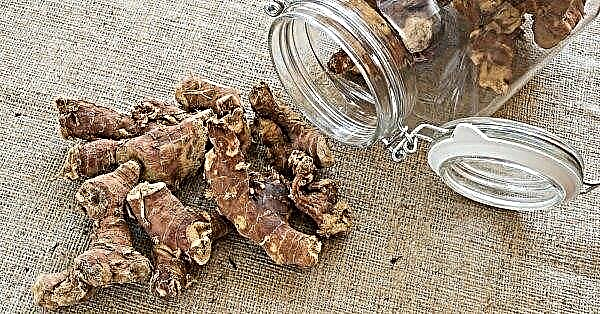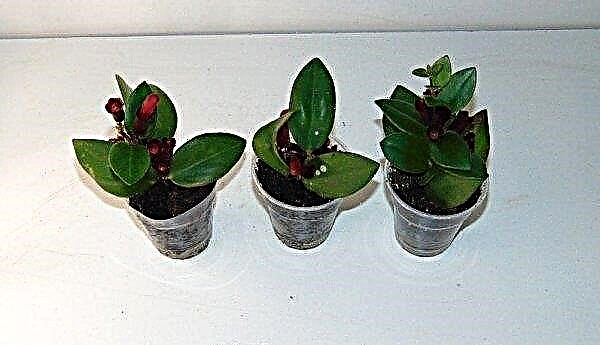Many people know about the benefits of onions, but not everyone knows that husks can be used. We will tell you more about the benefits of this raw material for the garden.
The chemical composition and benefits of onion peel
Very often, onion husks are simply thrown away like unnecessary garbage. But not everyone does this. Gardeners with experience know that this is a very good tool that can be used both as a fertilizer and in the prevention and control of various pests and plant diseases. What is this remedy useful for?
Did you know? The artist from Zaporozhye Rita Sidorenko came up with the technique of creating paintings from the husks of onions and garlic. Her paintings for about 10 years have been popular not only in Ukraine, but also in Canada, Israel and other countries.
Its beneficial effect is due to the diverse chemical composition:
- volatile products are contained in essential oil and have a detrimental effect on pathogens, fungi and spores;
- carotene is a natural antioxidant. It helps to restore weak plants, improves the condition of foliage and flowers, prevents the falling of the ovary;
- copper, magnesium, iron, and other trace elements strengthen the plant's endurance and resistance to stress. Phosphorus promotes root growth, which helps to get the maximum amount of nutrients from the soil;
- vitamins have a beneficial effect on development (B vitamins accelerate growth);
- flavonoids act on enzymes, thereby accelerating the ripening of vegetables and improving their taste.
To obtain the maximum effect, only freshly prepared infusions and decoctions are used. Harvesting such funds for future use is not recommended.
Due to the presence of these and many other components, the benefits of onion peels for the garden are versatile:
- it is cheap fertilizer;
- good mulching material that favorably affects the soil structure;
- effective remedy for many diseases and pests;
- successfully used in floriculture.
Benefits of Onion Hull Fertilizers
- The benefits of onion flakes are obvious and are as follows:
- comprehensively affect the development of plants;
- free and easy to prepare and use;
- safe for the environment and humans;
- universal in use (fertilizer, disease control, mulch and compost).
What plants seedlings can be fed with this fertilizer
Seedlings of all plants after top dressing with onion peelings will look better and healthier. Peppers, tomatoes and cucumbers are especially fond of such procedures. Onion remedy will prevent yellowness, stretching and seedling diseases.
Did you know? About 0.5 million tons of onion husks are thrown away in Europe every year. And on the eve of Easter, when it is used as a dye for eggs, the price of this raw material is about 22.50 euros per 1 kg, while the price of onions — about 2 euros.
It can be used both in the form of infusions or decoctions, with which seedlings are watered or sprayed, and by adding dry cleanings to the soil for planting. Watering or spraying with onion husk infusion prevents the emergence of such a seedling disease as a black leg, which can destroy almost all plantings. The method of preparing the seedling product is very simple: a handful of husk must be poured with a liter of boiling water and insisted for about 12 hours. This tool can be used for both watering and spraying. For irrigation, you can prepare a more complex means: combine 2 handfuls of cleanings with 1 tsp. ash and pour a liter of boiling water. Insist a day and can be used.
The method of preparing the seedling product is very simple: a handful of husk must be poured with a liter of boiling water and insisted for about 12 hours. This tool can be used for both watering and spraying. For irrigation, you can prepare a more complex means: combine 2 handfuls of cleanings with 1 tsp. ash and pour a liter of boiling water. Insist a day and can be used.
Watering or spraying is carried out at intervals of a week. Young plants after planting in the garden or in the greenhouse can also be watered with onion solution. After 10-12 days, 0.5 l of such fertilizer is poured under each bush. Later, the norm can be increased to a liter. Regular spraying (once every 7 days) will significantly increase the number of ovaries.
Important! It is preferable to use the husk of red onion varieties, they contain more quercetin. This substance strengthens seedlings and promotes rapid growth.
Feeding
For feeding seedlings or indoor flowers, it is not worth harvesting onion husks, since a small amount of raw material will be enough for these purposes. But if we are talking about fertilizing the beds in the garden or garden plot, then the raw materials should be procured in advance. Dry scales are packaged and stored in cardboard boxes or paper bags. Bags made of polyethylene are not suitable for this, the husks in them will become damp and may even become moldy. In a dry place, raw materials do not lose their beneficial properties until 4 years. For dressing, you can use decoctions or infusions. If the husks are boiled for several minutes, we get a decoction that can be used after cooling down after a few hours. But they often use infusion, since it retains more useful properties. The infusion is prepared by soaking onion flakes in boiling water or cold water. We will analyze more specifically which crops and how to fertilize with onion peelings.
For dressing, you can use decoctions or infusions. If the husks are boiled for several minutes, we get a decoction that can be used after cooling down after a few hours. But they often use infusion, since it retains more useful properties. The infusion is prepared by soaking onion flakes in boiling water or cold water. We will analyze more specifically which crops and how to fertilize with onion peelings.
Important! Means of onion flakes can be used not only for indoor plants, but also for flowers growing on flower beds. You can use the same tool as for indoor flowers.
For tomatoes
Tomatoes love watering with onion husk solutions, which not only act as fertilizer, but also prevent the occurrence of gray and black rot.
The basic rules for feeding are as follows:
- the solution is prepared by insisting 2 cups of onion husks in 2 liters of boiling water for a day. Before use, the product is diluted 1: 3 with water and used for irrigation;
- 2 root top dressings are enough for a season. The first is carried out 10-12 days after the planting of seedlings on the beds, and the second - during the flowering period;
- 0.5 liters of liquid are poured under young seedlings, and for adult plants, the volume increases to 1 liter;
- when planting seedlings in a permanent place in the wells, you can add a little (2-3 pieces) of dry onion flakes.
Video: how to prepare a solution of onion peel
For cucumbers
When fertilizing cucumbers, you need to follow simple recommendations:
- it is better to fertilize the cucumber bushes not by root dressing (to prevent leaching of the roots, which are located close to the surface of this crop), but by spraying;
- for the preparation of fertilizer 1 tbsp. husks pour 2 liters of boiling water and insist for about a day. Before use, the product is diluted with 2 liters of water;
- 2-3 sprayings per season are enough;
- with yellowing of foliage of cucumbers (pumpkin or zucchini), it is useful to carry out foliar top dressing with this composition: 1 tbsp. boil raw materials for 5 minutes in 2 liters of water, add 1 tbsp. mustard powder and add up to 10 liters of water;
- it is not advisable to make dry husk in the holes when planting cucumbers, as it gives bitterness to the fruit.

For indoor plants
Fertilizer from onion peel is useful not only for vegetable crops, but also for indoor plants. Indoors, flowers often lack lighting, dry air and lack of nutrients.
Important! Treatments with onion preparations should be carried out before or after flowering so that they do not deter pollinating insects.
The use of onion products will help to solve these problems:
- to prepare a decoction, 1 cup of raw material is boiled in 1.5 liters of water for about 5 minutes. After cooling, you can water the flowers. For each plant, 50-60 ml of fertilizer is enough;
- the remedy must be used for weak and aching indoor flowers, but it will also be useful for healthy specimens;
- onion fertilizer is applied about 2 times a month. You can alternate it with the introduction of complex mineral fertilizing. But you need to focus on the appearance of plants;
- Especially useful will be such top dressing in early spring, when plants after winter enter a period of active growth;
- the use of onion preparations will serve not only as fertilizer, but also scare away from flower pots midges and other pests;
- for cacti, fatwomen and other succulents, as well as ficuses, this tool is not suitable. It can stop their growth.
Video: onion remedy for indoor plants
How to use a decoction or infusion to control pests and diseases
Onion flake products are not only an excellent fertilizer, but also a drug that helps get rid of many pests. It will be useful in the fight against aphids, ticks, caterpillars and other harmful insects. The use of the drug for prevention is effective.
To combat the spider mite
To get rid of the spider mite, the following recommendations apply:
- 1 liter jar of onion flakes must be poured with 2 liters of boiling water and insist 2 days. The finished infusion is filtered and diluted with water (1: 2). For better adhesion, you can add a little laundry soap;
- for large plantations, such a preparation is prepared: pour half a bucket of husk to the top with boiling water and insist 2 days. Dilute the drug with water 1: 2, add a little soap, and you can apply;
- spraying is carried out in clear weather in the morning, and preferably in the evening, 2-3 times with an interval of 5-7 days;
- for preventive purposes, spraying is applied at intervals of 10-12 days. With mass attacks of pests, treatment with folk methods may not give the proper result, so you have to resort to chemicals.

To fight aphids
To prevent the appearance or get rid of a pest such as aphids, you can also use onion peels:
- a tightly filled glass of onion flakes is poured with 8 liters of boiling water and insisted for about 1-2 days. Strain and spray the solution onto the plants. As with tick control, you can add laundry soap;
- to speed up the process, the above composition can be boiled for about 5 minutes. The resulting broth can be used immediately after cooling;
- treatments are carried out at intervals of 4-5 days in the morning or in the evening. For the prevention of spraying, spend every 10-12 days.

Universal infusion
In the fight against various pests, universal remedies are used:
- Pour 200–250 g of raw materials with 7–8 liters of cold water and insist for about 3 days. After filtering, you can start spraying;
- the gruel of 2 large onions is mixed with 200 g of husk and pour 8 liters of boiling water. After insisting about 8-10 hours, the drug is filtered and used for processing;
- so that the effectiveness of the drug does not decrease, only freshly prepared decoctions and infusions are used.
Recommendations for use
In the garden, kitchen garden or in the country, onion peel will be useful both as a fertilizer and as an insecticide:
- during autumn digging, onion scales can be added to the soil or added to the holes immediately before planting;
- as mulch, husks are mixed with peat or sawdust. This mixture is sprinkled with aisles or near-trunk circles of trees and bushes. The tool will protect the soil from drying out, slow down the growth of weeds and serve as fertilizer;
- when watering strawberries with infusion of onions, the berries become larger and tastier, and using the product on the beds of carrots will make root vegetables more tasty and improve the presentation;
- the cake remaining after decoctions or infusions can be placed in compost or dug directly in the garden;
- husks for cooking should be harvested only from healthy onions.
 After reading our article, every housewife, knowing the benefits of onion peel, will not throw it away. If you do not have a garden or a summer cottage, then use onion remedies to improve indoor flowers. All plants will be grateful for such universal top dressing.
After reading our article, every housewife, knowing the benefits of onion peel, will not throw it away. If you do not have a garden or a summer cottage, then use onion remedies to improve indoor flowers. All plants will be grateful for such universal top dressing.

